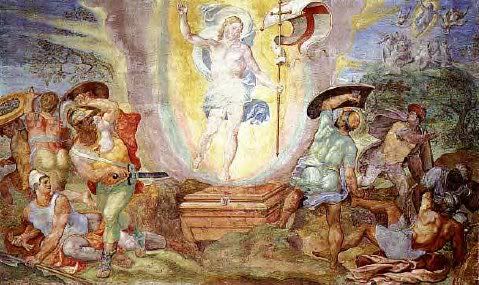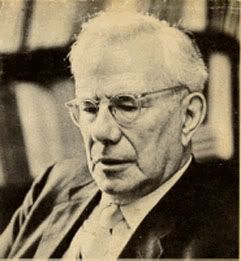
Analyzing each verse one at a time...
(7)For a man ought not to have his head covered, since he is the image R424 and glory of God; but the woman is the glory of man.(8)For man R425 does F116 not originate from woman, but woman from man; (9)for indeed man was not created for the woman's sake, but woman R426 for the man's sake.
This passage could easily be taken for an endorsement of subjection. "Man was not made for woman, but woman for man." On the other hand, woman was made for man, but not to be subject to him. In the section of Genesis we showed that the term "helper" ezer does not mean a subordinate but an equal, a source of strength. Here Paul is addressing those influenced by (or potentially so) the Gnostic faction. He is alluding to the creation of male and female in the garden. The point being to reaffirm marriage as a commitment, a mutuality, guided by agope and the original view of creation. This is why the woman should not run around dressed like an adulteress or "hooker," because God's plan calls for a marital union in love and good faith. The wife is a source of strength or even a kind of protection (Emotional) for the husband. At the same time Paul is taking a slap at the Gnostic view that woman was created first, and that the Gnostic initiate is freed from gender.
(v10)Therefore the woman ought to have a symbol of authority on her head, because of the angels.
This is one of the most obscure passages in the Bible. No one has a clear idea of what it means, so I will deal with the angels after dealing with the first part of he verse. a symbol of authority on her head. That certainly sounds like a command to subordination. The problem is, its translated wrongly! Not only is the translation bad, but it has been (purposely?) batched so as to indicate the exact opposite of what it says. It should read for these reasons, the woman should have power over her own head. Or, "she should be able to decide for herself whether or not to cover her head." This is not a radical proposal, it's something that most Greek scholars know well, and have known so for a long time. Sir William Ramsay, the great archaeologist who, at the turn of the last century, proved so much accuracy for the book of Acts, and established Luke as a valid historian, openly mocked the traditional rendering! He called it "a preposterous idea which a Greek scholar would laugh at anywhere (except in the New Testament, where they seem to think Greek words can mean anything commentators choose." (see Ramsay, Cities of ST. Paul (Londong: holder) 1907, 203).
The word exousian (exousian) means "liberty," "privilege," "authority" but of a kind that is one's own. The Centurian told Christ, "I am a man under authority. I say to one 'go' and he goes and 'come' and he comes." He describes himself as one who must be obeyed, but says he is "under authority," why? Because that is the word exousian. the Centurion's authority was delegated by Rome, but it was his own authority to wield as he saw his duty. It was his privilege to command as he saw fit. The word means one's own power, it does not mean "to be under subjection." It is the woman's own power to veil or not, as she sees fit. Ramsay himself proved this in the Cities of St.Paul. On one of his digs he found a statue of a woman, the inscription of what clamed that she had "three powers on her head." This was Ramsey's rendering, and it was the same word. This meant, she was the wife, daughter and mother of kings.
Intermediate Liddell and Scott Greek Lexicon (Oxford, 1983) defines the word: I."Power or authority to do a thing. Magestry, the body of mageistrtes, authirities, powers." II. "Means, resources."
It certianly looks to me as though that word is entirely concerned with the ability of the bearer to work by his/her own peragative, and not subjection to teh authority of another. The Barclay Newman Greek Dictionary defines it as "liberty, power, authority, to be in subjection or to wear a viel." I showed that to my Greek teacher (a Classicist from Yale) who laughed himself silly saying "the Greeks never had a word like that!" This just shows the bias of Christian publications on this topic.
dia touto ofeilei h gunh exousian ecein epi ths kefalhs dia tous aggelous
dia touto, because of all this, because of this, ofeileishould, h gunh the woman exousian ecein epi ths kefalhs have power over her own head.
William P. Welty, ISV foundation,"Rethinking the Veil:Another Approach to I Corinthians 11:2-16" agrees and presents other examples where exousia illustrates the authority of the bearer. He argues that every time exousia is used in the NT his bears this meaning.Examples he provides
Luke 9:1 believers given it over demons
Rev 2:26 given to those who overcome
5Rev 6:8 destroying angel to slaughter 1/4 of the world
Rev 13:7 anti-Christ given to beat up the saints
(William Welty is the Executive Director of The ISV Foundation of Yorba Linda, California. The ISV Foundation produces the Holy Bible:International Standard Version.
Here's a problem. The connecting phrase is "dia" meaning "for this reason." So for what reason? What came before is that the woman should cover her head because woman is made for man. How does this make sense? The woman should have her own authority to decide about veiling because she was made for man? The phrase dia touto means "because of this, for this reason," so he's saying because of this whole idea I've been developing; the Christian concept of marriage, the whole purpose of God in creation of genders, to be one flesh and to help each other. The woman should have her own right to decide, not because she was created to be a salve and serve man, but because she is created in God's image like the man, and is equal with him in the economy of God. All of this Paul is driving at and leading up to. The second reason he gives backs this up:
And because of the angels. No one has given a satisfactory account of this verse except Kate Bushnell. Tertullian ascribed it to lust; women's faces cause angel to lust (which I think tells us more about Tertullian than it does about angels). Some have said these are human messengers (angeloi) who will see the woman looking like hookers and get the wrong idea. That is possible but it would be a pretty kryptic remark. Bushnell has the most fitting and logical answer:
When the disciples asked the Lord which of them would be greatest in the kingdom of heaven, Jesus set a child in their midst, and informed them that until they humbled themselves as such they could not even enter that kingdom. From the child He transferred the lesson to "one of these little ones that believe on Me," i.e., to the believer humblest in rank among them, saying, "Take heed that ye despise not one of these little ones; for I say unto you, that in heaven their angels do always behold the face of My Father who is in heaven," Matthew18:10. The words in verse 10 bear the translation, "because of her angels," the definite article in Greek often having the force of a possessive pronoun, and thus the verse should have been rendered. Paul taught that "angels" were inferior in rank to redeemed man, 1 Corinthians 6:3. They are ministering spirits to us, Hebrew 1:14. Yet the most despised women's angels stand before God, with no intervening veil, and behold His face. Shall not woman be permitted to do as much as her "ministering spirits" are allowed to do? Man unveils because Christ, his Head, is unveiled before God. Woman "ought to have the right" to unveil because not only is Christ, her spiritual Head, unveiled before God, but man, her matrimonial head, also; and, if this were not enough, then her ministering spirits "do always behold the face" of God. This is the Apostle's argument. Shall man attempt to require that woman veil out of respect for his authority (?) over her? Not when God does not require man to veil out of respect for God's authority over man.
The women's guardian angels behold the face of God unveiled, why shouldn't the women?
Bushnell (GWTW)
244. A little historical evidence at this point ought to go a long way. If the Apostle, as is so often assumed, was accustomed to forbid women unveiling, how did it come to pass that women "sat unveiled in the assemblies in a separate place, by the presbyters," and were "ordained by the laying on of hands," until the eleventh canon of the Church Council of Laodicea forbade it, in 363 A.D.? I give the account in the words of Dean Alford in his comments on 1 Timothy 5:9; the same admission is made by Conybeare and Howson in their Life of St Paul, and stands undisputed in church history.
(11)However, in the Lord, neither is woman independent F117 of man, nor is man independent F117 of woman.
Paul is saying, the woman should have the right to decide for her self, but she should choose to viel. The rights of the individual should not be taken away, but no one person outweighs the importance of spreading the Gospel. Women should be able to decide such matters on their own, but they should choose rightly. We are not islands, we are interconnected. This not only puts the responsiblity upon the woman to choose rightly, it also frees her from the spectre of a metaphysical hieararchy. Here he goes on to deconstruct the seeming hieararchy he appeared to be constructing:
(v12)For as the woman originates F118 from the man, so also the man has his birth through the woman; and all R427 things originate F119 from R428 God.
If there is any authority in man being made first, it is disrupted by the fact that all things go back to God, and both genders are created in the divine image.
Now comes a torturous bit of logic in which Paul seems to strain credibility.
(13)Judge R429 for F120 yourselves: is it proper for a woman to pray to God with her head uncovered?
(14)Does not even nature itself teach you that if a man has long hair, it is a dishonor to him,
Well frankly, for those of us who grew up in the 1960s, in the Bible belt, this was an over used verse between about 1965-1970. Frankly, no one under 20 could see the logic in it then, and I'm still trying. How could nature tell us that, how could it tell Paul that? The Nazerites, Sampson, John the Baptist, nothing we know of in Hebrew culture would have led St. Paul to believe that it was a shame for a man to have long hair. Certainly nature doesn't tell us that, where the lion has the long hair, the horse, many other animals.
As Bushnell said "it is the Barber who tells us that."
She goes on to Point out:
14) "Nor[3] doth even the nature itself [of hair] teach you," etc. Our idiomatic English would say, to express the same idea, "There is nothing in the nature of hair itself to teach you,"¾a simple statement that appeals to everybody's common sense, while, as a question, this is an absurdity. The entire Chinese nation of men disproves the statement of theologians that Nature gives women long hair and men short hair. No artist would dare paint a portrait of Jesus Christ with short hair. Is His hair "a shame" to Him?
Bushnell changes the reading to the more logical "nor doth even nature..." there is in fact no reason to make it interogative. Welty agrees and follows Bushnell;it is proper for a woman to pray without head covering, nature in no way teaches, on the one hand, that if a man has (long) hair it puts him to shame nor does it teach on the other, that a woman's hair is her glory. this is true because hair is given as a substitute or man made coverings.
anti= substitute, Hooker agrees with Welty (6).
Welty courageously translates the passage in the only way that it makes sense (in the ISV).
How can it be that a woman is dishonoring her head if she goes without a viel, but hair is given her for a covering? That implies that going bear headed (but with hair) would be the same as dishonoring her husband, that's the original offense! Paul says if she doesn't cover her head she appears as the women who shave their heads. That would indicate that she's just without a hat or a scarf on her head. But how can hair be both what is given her to replace a covering, and the original offense for which she must make amaense by covering it up?
Welty noticed these problems too, his translation for the ISV reflects the logical solution:
(13)It is proper for a woman t pray to God Without head covering. (14)Nature in no way teaches, on the one hand, that if a man has hair it puts him to shame. (15) nor does it teach on the other that a woman's hair is her glory. all of this is true because hair is given as a substitute for man made coverings (16) but if anyone seems to be disturbed by all this niether we nor the chuches of God have any such custom.
Welty's explaination for this approach is to essentially remove the interogative and transforms the rhetorical questions into posative statments.
First, the term "long" is not in the text. The term is usually inserted into English by the translator to complete the thought.
The construction on the one hand...on the other hand is justified by the presence of the linking partaciples "men..de:" (in red) "nature in no way teaches that on the one hand if a man has [long?] hair...nor does it teach on the other hand that a woman's hair is her glory." That men-de construction for on the one hand, on the other hand is just basic first year Greek, which I actually happen to remmber. "all of this is true by the causal principle "'oti."
"hair is given as a subsitute for a manmade covering" Welty jutifies by the presence of "anti." He points out that anti as meaning substitution is so well known doesn't need documentation, but he points to Hooker to back him up. The term "man made" he supplies himself, just as the former translator supplied "long." But that is called for by the sense of the passage. The removal of an interrogative is justfied by the logical fit of he meaning, as well as the fact that the interogative ear marks could just as well be negations; oude means "neither, not."
Here is my own interliniar:
| 13)It is proper for a woman t pray to God Without head covering. | (13) en umin autois krinate prepon estin gunaika akatakalupton tw qew proseucesqai |
| (14)Nature in no way teaches, on the one hand, that if a man has hair it puts him to shame. | (14) oude h fusis auth didaskei umas oti anhr men ean koma atimia autw estin |
| (15) nor does it teach on the other that a woman's hair is her glory. all of this is true because hair is given as a substitute for man made coverings | (15) gunh de ean koma doxa auth estin oti h komh anti peribolaiou dedotai auth [auth] |
| (16) but if anyone seems to be disturbed by all this niether we nor the chuches of God have any such custom. | (16) ei de tis dokei filoneikos einai hmeis toiauthn sunhqeian ouk ecomen oude ai ekklhsiai tou qeou |
Paul gives women the power to decide for themselves about veling, even though he has an opinion as to what the proper choice would be. Because he gives this power to women, and he wants men to unviel (as it indicates condemnation) he is not calling from female subjugation, but quite the oppossite. He re-affirms equality and the right to women to serve God as they feel called, while at the same time re-affirming the value of marriage and the original plan of unity between the sexes in God's original design of creation; that desing is re-invigorated through the Chruch, women helped to spread that massage in Paul's day just as they do in our own.







